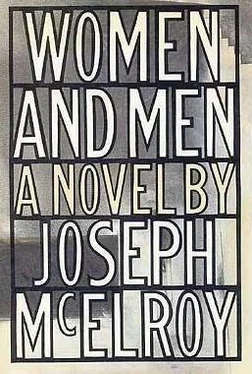And it had been in the gap of their separation during which he had reached for the phone amid a stream of white towels, green clanking lockers, clattering squash-racket heads flickering by his chair, a clank of scales, a sweaty essence of rubbing alcohol, shaving lotion, the breath of sweet whiskey, and other words and sights altogether heavy enough so that he might have thought to see this word Spence materialize here but Mayn knew that this was unlikely in this absence of his own in which he could no more conceive of his children never having been than miss any more a real ten-year-old boy named Andrew (who’d start talking to him as if he’d never been away saying, "See, Jimmy has this dog that’s having puppies") and whom at five he had lost on the subway, and a real three- or nine- or twelve-year-old girl named Flick who listened at eighteen to his tales of — let’s tell the press it’s called— telepathic separation (though he never put it that way), telepathic separation, there’s the inside dope — and didn’t say a word, and whom likewise he didn’t live with any more — partly because the boy wasn’t five or ten any more (though he might live to lose his old man on the subway) and the girl, who was two years older than the boy, wasn’t nine sitting in a yellow wall of a school bus any more but was fourteen now and would be eighteen in 1974.
But say the word.
Mayn said it. Spence.
"Yes," said Joy into the phone as if she were part of an experiment, "I was thinking it all right."
They exclaimed at how this correspondence occurred. They didn’t know. Did Joy know what Spence had said to Mayn once when a prominent importer had committed suicide — said he knew Mayn’s mother had committed suicide because Mayn had told him but thought maybe it took a second suicide to balance the first — but "I never mentioned my mother to that son of a bitch—" "Remember you’re not very bright, pal," Joy said, "he’s given you your own stuff back so you didn’t pick it up." Well that wasn’t accurate, but he wasn’t going to argue. They joked and he exclaimed again and said he wondered if their interstellar communication was the real thing, but he said he didn’t believe in this real thing anyway, it was coincidence, but Joy said she didn’t care about the proof of it, which (he at once said) was beyond him in any event (and beyond the scientists too, he thought); still she seemed uncertain (uncertain for her), and he thought she was seeing someone seriously, it was two years since 1968, and he asked to speak to the children at the same time thinking that the knowledge he and Joy had of each other sometimes made the children not there, and Flick wasn’t home but Andrew was and asked when his father was coming to see them, he’d made a headband and a belt with the leather kit and was going to make a pair of real beaded moccasins. Mayn felt his hand getting cold and felt it on the dry compactness of kapok — the life jackets Joy had spent time pricing one spring — and he put his drink on a table, then took a quick sip and put it down again and said to his son that yes he would visit them in about two months but he would have to ask Joy and maybe they would take a trip in July, and when Andrew said he would ask Mommy now, Mayn managed to hold him, knowing Andrew thought he’d meant all four of them; but then he couldn’t bring himself to say to Andrew, "You, me, and Flick" and he asked Andrew to put Joy on again, but after Andrew said, "O.K., Dad," he said to his mother, "Dad wants to take me and Flick on a trip," and Mayn called into the phone "In July!" so that a man standing in a towel who had just said "Six percent" to another man in a towel stopped talking and looked at Mayn as if July reminded him of something he didn’t want known, say he was speculating in kapok futures, one hand protectively over his balls.
Joy said, "You never told me you’d been in South America and I do read the paper and I guess I happened to hit on Spence because you’d said he had a bad reputation and took chances you wouldn’t take, but worse than chances; and I knew it was business you were on but I worried."
He had believed her, but her worry had been a new kind of distance that scared him — was he, well, another person now to her? — but what did he expect? And she hadn’t gone so far as to say he ought to have told her.
He didn’t owe her anything.
The waiter’s bar check had had a dark-gray arc across it from the glass. Now he and Joy had said goodbye and he had forgotten to say, Give my love to Flick. Maybe the marriage had not broken up.
But here was Flick in ‘74, and the future he had once felt divided from by these trips back home to his family was his state now.
Yet multiplied with more than interest and fascination and capability and a push of what might have been lonesomeness if it had been all around him instead of just behind him — multiplied also into what he recognized as having been once familiar, namely being in two places at once: in the old days, one of them was that household of his parents where old troubles were reinvented every day or week and the least of troubles was his father’s getting out a paper every Thursday — and the other household was his grandmother’s down the street where he looked at albums of brown snapshots of his mother on a tricycle, his mother on a swing hung from the maple in her backyard, his mother at six and seven darkly calling with her arm thrust out into the sky; the same unusual mother who once before her own disappearance into the elements had told him of a mythical town his grandmother (her mother) had named — and then Jim’s mother caught herself — that seemed also to be their own hometown, and Jim had been able to tell his mother that he knew the name of the town, which did not exactly enable her to die with a smile on her face because she didn’t die — at least, not then — but enabled her to smile remembering stories Margaret had told her too — albums, albums, and albums at his grandmother’s down the street where, when he stayed there and heard the doves like liquid flowers opening again and again, and the distant sleep of his grandfather, he would get up twice each early morning; the household where (in bed) he learned to whistle; and where he unearthed clippings from the nineties when his grandmother had traveled to Chicago and the West, mailing her indulgent impressions back to Windrow to be printed in the Democrat, and never let herself become an old person leaning painfully forward in a chair in order to hear.
Multiplied now into a life he could not explain to Joy. Except in some condensed report of acquiring information, and getting at the truth. And not wasting any more words. So many covering the distance they’d come. While feeling also that a world for which the word world was wrong was happening to him like a long-range capability and he might be part of its vein and cracks if he knew more, but the knowledge brought out the coward in him if laziness was a form of cowardice; and if he would not bang his head against someone else’s table at night thinking again how he might after all have found a way to live with his wife, he could feel wasted by his freedom, he could phone the dreaded Lucille once, and he could like her, and be told to see a movie called Persona and see it and wonder if women were Lesbians, this freedom of his renewing him to be courageously annihilated in future until he became half-convinced he’d been turned into some future more fearful and less original than dabbling imaginers had already worked out. And so he would try to get away from that distant future through which he fell, by seeing such other times as perhaps had not been altogether lost and seeing them so well that they came back into being, times the world had passed through and times when he and his wife had hurt each other — had shown some soulmate kinship in how they moved apart — had even had a lot of laughs — even to finding in the paper at the same moment the morning after Playhouse 90’s Judgment at Nuremberg that the actor Claude Rains had had the last two words of his outraged question deprived of sound — kaput — because the sponsor was the American Gas Association which in 1959 supplied almost every kitchen range in America. The question was "How in the name of God can you ask me to understand the extermination of men, women, and innocent children in gas ovens?"
Читать дальше












